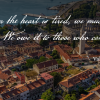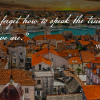
Published: November 30, 1998
View the Original Newsletter: Iskra-23.pdf
About This Issue
Iskra No. 23 explores one of the most personal and thought-provoking essays by Valentina Krčmar, examining the delicate relationship between Croatia and its diaspora. Writing from both experience and humility, Valentina reflects on whether Croatians living abroad should play a political role in the affairs of their homeland. The issue also includes community news, cultural updates, and commentary on current political and social events in Croatia and the wider region.
Motrišta: “Who Speaks for the Homeland?”
In this deeply introspective column, Valentina Krčmar shares an encounter that sparks a difficult question — does the homeland truly “love” its emigrants? She recalls being told in Zagreb that some locals feel those from abroad should not interfere in national decisions. Initially hurt, she later came to understand the complexity of their view.
Valentina writes about her own experience running for a seat in the Croatian Parliament representing the diaspora. Despite her dedication and long-standing work for Croatia, she was ultimately disqualified for “administrative reasons.” Though disappointed, she came to realize that genuine representation must come from those who live daily within Croatia’s reality — those who ride the tram to work, buy children’s schoolbooks, and live on modest wages.
She acknowledges the immense contribution of Croatians abroad — through advocacy, funding, and humanitarian work — but insists that political authority must rest with those living in the homeland.
“It was our duty and privilege to work for Croatia, not something we should be thanked for,” she writes. “We are our own people — not foreigners to whom gratitude must be offered.”
Valentina concludes that the diaspora’s role should be advisory, focused on economics, ethics, and democracy-building — areas where global experience can enrich Croatia’s growth. Her reflections are both honest and compassionate, calling for balance between national pride and practical understanding.
News Highlights
Prepared by Slavko Butković, this section reports on significant events in late November 1998:
-
Croatia and Slovenia continue negotiations over land and maritime borders, particularly the Piran Bay dispute.
-
President Franjo Tuđman meets with political leaders to address opposition boycotts in the Sabor (Parliament).
-
The Croatian Democratic Union (HDZ) reviews its 1999 economic and social policies and explores dialogue with opposition parties.
-
The Croatian Christian Democratic Union (HKDU) rejects joining the six-party opposition bloc, preferring independence from both government and opposition.
-
The first Conference of Returnees in Vukovar concludes with twenty resolutions urging faster reconstruction and better application of laws for war-affected regions.
These updates depict a country still struggling with post-war recovery, governance challenges, and the reintegration of displaced citizens.
Croatian Catholic Union Report: Visit to Banja Luka
A remarkable English-language feature by Melchior Mašina, National President of the Croatian Catholic Union of USA and Canada, details his October 1998 visit to Banja Luka and northwestern Bosnia. His travelogue exposes the devastation of Catholic churches, ethnic cleansing of Croats, and the enduring suffering of communities under Republika Srpska control.
Through eyewitness accounts, he describes destroyed villages, desecrated churches, and mass graves, lamenting the lack of international response. His testimony underscores both the tragedy and resilience of the Croatian people in Bosnia and Herzegovina.
Community News
The issue is rich with updates from Croatian-Canadian organizations:
-
Croatian Fraternal Union announces its annual St. Nicholas celebration for children.
-
Canadian-Croatian Society of Pensioners hosts a Christmas social on December 9.
-
Canadian-Croatian Congress of Toronto prepares its Christmas Banquet to raise funds for Croatian language programs at the University of Toronto.
-
Croatian Club Karlovac and St. Lovro–Vivodina Association announce a New Year’s Eve Gala at the Ukrainian Catholic Church Hall in Mississauga.
-
Croatian Fund “Slavonija” organizes its own New Year’s celebration in Toronto.
The community section reflects unity through cultural and charitable events, showing how the diaspora continues to nurture heritage and connection despite distance.
Politics and Opinion
The newsletter’s political pages reprint select commentaries and brief notes from Croatian newspapers, covering parliamentary developments and the case of Dinko Šakić, the former Jasenovac commander, whose trial drew international attention.
Sports
Sports coverage by Tomislav Čuto celebrates a stunning upset — Croatia Zagreb’s victory over Ajax Amsterdam in the Champions League. His detailed analysis praises the team’s courage and strategic discipline, crediting coach Velimir Zajec for revitalizing morale and national pride.
“Croatia’s youth brought down Ajax,” he writes, calling it a triumph of heart and intellect — “a match played with both brain and courage.”
Humor and Poetry
The issue closes with satirical verse by Ivica Puhalo, lampooning world politics and media hypocrisy surrounding Serbia and Iraq. Interspersed with witty asides and social critique, the section brings levity after the heavier political and historical articles.
Closing Thoughts
Iskra No. 23 captures the evolving voice of a nation and its diaspora — proud, reflective, and deeply intertwined. Through Valentina Krčmar’s editorial honesty and the vivid reports from home and abroad, the issue challenges readers to reconsider what it truly means to serve one’s homeland: through words, deeds, or the courage to listen.




